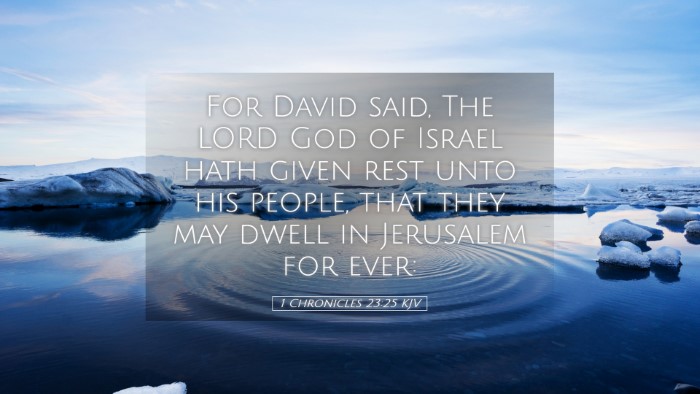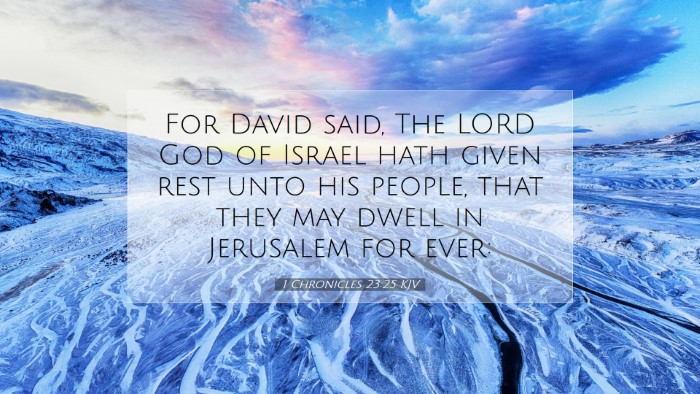Commentary on 1 Chronicles 23:25
Verse Context: 1 Chronicles 23:25 states, "For David said, The LORD God of Israel hath given rest unto his people, that they may dwell in Jerusalem for ever: and also unto the Levites; they shall no more carry the tabernacle, nor any vessels of it for the service thereof." This verse highlights David's recognition of God’s provision for His people and the established place of worship.
Significance of Rest
Historical Perspective: Matthew Henry emphasizes that David acknowledges a change in the nature of worship. The "rest" signifies a transition from the nomadic worship of the tabernacle to a more permanent structure in Jerusalem. The expression indicates a settling in, providing psychological and spiritual peace that allows for dedicated worship.
Theological Implications: Albert Barnes comments that the "rest" refers not only to the cessation of physical labor but also to a spiritual peace brought by God. This peace is foundational for Israel’s identity and highlights the fulfillment of God’s promises to His people, nurturing a deeper relationship between God and Israel.
David’s Role as a Leader
Leadership Insights: Adam Clarke notes that this decree from David reflects his pastoral concern for the people and the Levites who served in religious capacities. David's leadership saw beyond military victories; he desired a lasting legacy of worship that rooted Israel in their covenant identity.
Pastoral Application: Pastors today can draw parallels from David’s actions, understanding that spiritual leadership involves creating environments where worship thrives. Clarke suggests that leaders should prioritize the spiritual well-being of their congregations, organizing their ministries around nurturing worship and rest in the Lord.
The Role of the Levites
Ministry Transition: This passage signifies a transition for the Levites. Previously tasked with portable worship, they are now assigned to a more stable form of service. Matthew Henry discusses the implications of this transition, asserting that a clear structure in worship can foster longevity in spiritual practices.
Vessels and Service: Barnes elaborates that the reference to "vessels" signifies the tools of ministry which are no longer needed in the same capacity. The Levites could now engage in more direct forms of worship and service, which required a radical transformation of their roles within the community.
Theological Understanding of Jerusalem
City of God: The mention of Jerusalem resonates deeply with the theological concept of a holy city. Clarke reflects on the significance of Jerusalem, linking it to God’s covenant promises. It is here that divine presence will dwell permanently, which symbolizes stability and divine selection of a worship center.
Future Fulfillment: Further, this emphasizes prophetic implications as Jerusalem becomes not only a geographical center for Israel but serves as a foreshadowing of the New Jerusalem, where God’s people will find eternal rest and communion with Him.
Applications for Modern Believers
Finding Rest in God: For believers today, this verse conveys the importance of finding true rest in God’s promises. Just as David recognized the peace given to Israel, Christians are called to understand the rest afforded through Christ. This rest is spiritual, pertaining to salvation and assurance in God’s sovereignty.
Engagement in Service: Through understanding the transitional nature of the Levites' roles, believers are encouraged to engage in various capacities of service without the burden of exhausting labor. The focus remains on worship, proclamation, and community, aligning personal and communal aspects together in devotion.
Conclusion
This exploration of 1 Chronicles 23:25 through the insights from Matthew Henry, Albert Barnes, and Adam Clarke reveals a rich tapestry of meaning regarding worship, leadership, and spiritual peace. For pastors, theologians, and students, this passage not only illustrates historical transitions but invites deeper reflections on how these principles apply in the life of faith today.


